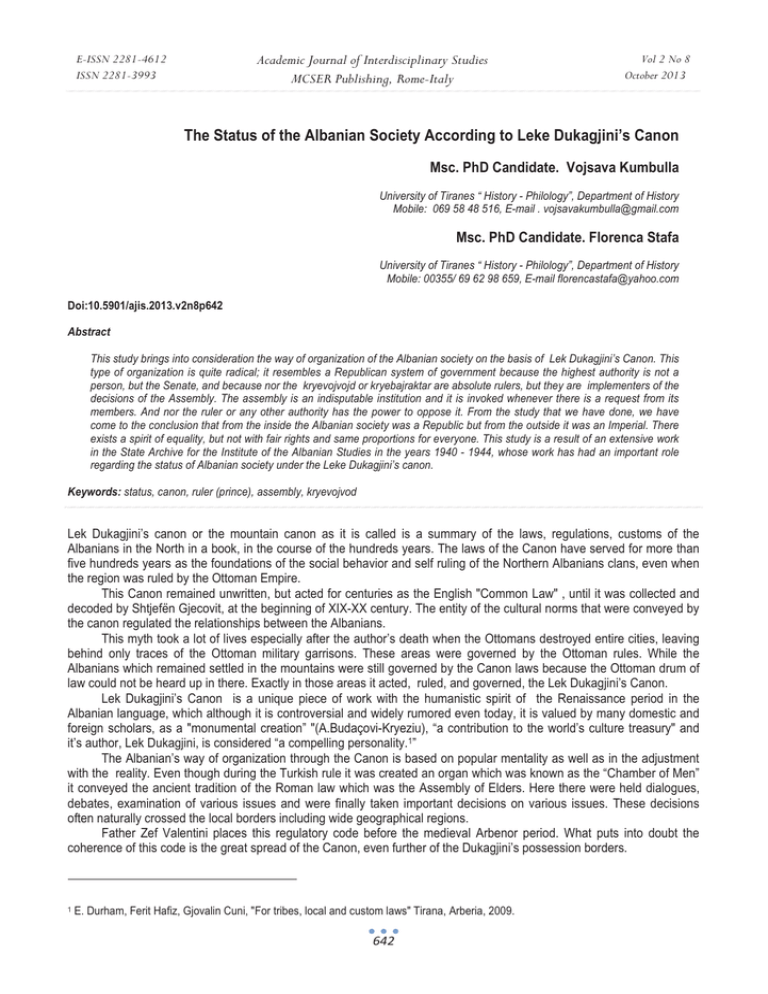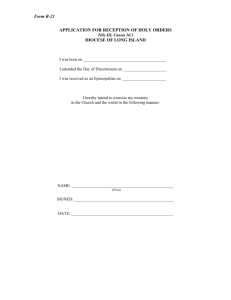The Status of the Albanian Society According to Leke Dukagjini’s... Academic Journal of Interdisciplinary Studies MCSER Publishing, Rome-Italy
advertisement

Academic Journal of Interdisciplinary Studies MCSER Publishing, Rome-Italy E-ISSN 2281-4612 ISSN 2281-3993 Vol 2 No 8 October 2013 The Status of the Albanian Society According to Leke Dukagjini’s Canon Msc. PhD Candidate. Vojsava Kumbulla University of Tiranes “ History - Philology”, Department of History Mobile: 069 58 48 516, E-mail . vojsavakumbulla@gmail.com Msc. PhD Candidate. Florenca Stafa University of Tiranes “ History - Philology”, Department of History Mobile: 00355/ 69 62 98 659, E-mail florencastafa@yahoo.com Doi:10.5901/ajis.2013.v2n8p642 Abstract This study brings into consideration the way of organization of the Albanian society on the basis of Lek Dukagjini’s Canon. This type of organization is quite radical; it resembles a Republican system of government because the highest authority is not a person, but the Senate, and because nor the kryevojvojd or kryebajraktar are absolute rulers, but they are implementers of the decisions of the Assembly. The assembly is an indisputable institution and it is invoked whenever there is a request from its members. And nor the ruler or any other authority has the power to oppose it. From the study that we have done, we have come to the conclusion that from the inside the Albanian society was a Republic but from the outside it was an Imperial. There exists a spirit of equality, but not with fair rights and same proportions for everyone. This study is a result of an extensive work in the State Archive for the Institute of the Albanian Studies in the years 1940 - 1944, whose work has had an important role regarding the status of Albanian society under the Leke Dukagjini’s canon. Keywords: status, canon, ruler (prince), assembly, kryevojvod Lek Dukagjini’s canon or the mountain canon as it is called is a summary of the laws, regulations, customs of the Albanians in the North in a book, in the course of the hundreds years. The laws of the Canon have served for more than five hundreds years as the foundations of the social behavior and self ruling of the Northern Albanians clans, even when the region was ruled by the Ottoman Empire. This Canon remained unwritten, but acted for centuries as the English "Common Law" , until it was collected and decoded by Shtjefën Gjecovit, at the beginning of XIX-XX century. The entity of the cultural norms that were conveyed by the canon regulated the relationships between the Albanians. This myth took a lot of lives especially after the author’s death when the Ottomans destroyed entire cities, leaving behind only traces of the Ottoman military garrisons. These areas were governed by the Ottoman rules. While the Albanians which remained settled in the mountains were still governed by the Canon laws because the Ottoman drum of law could not be heard up in there. Exactly in those areas it acted, ruled, and governed, the Lek Dukagjini’s Canon. Lek Dukagjini’s Canon is a unique piece of work with the humanistic spirit of the Renaissance period in the Albanian language, which although it is controversial and widely rumored even today, it is valued by many domestic and foreign scholars, as a "monumental creation” "(A.Budaçovi-Kryeziu), “a contribution to the world’s culture treasury" and it’s author, Lek Dukagjini, is considered “a compelling personality.1” The Albanian’s way of organization through the Canon is based on popular mentality as well as in the adjustment with the reality. Even though during the Turkish rule it was created an organ which was known as the “Chamber of Men” it conveyed the ancient tradition of the Roman law which was the Assembly of Elders. Here there were held dialogues, debates, examination of various issues and were finally taken important decisions on various issues. These decisions often naturally crossed the local borders including wide geographical regions. Father Zef Valentini places this regulatory code before the medieval Arbenor period. What puts into doubt the coherence of this code is the great spread of the Canon, even further of the Dukagjini’s possession borders. 1 E. Durham, Ferit Hafiz, Gjovalin Cuni, "For tribes, local and custom laws" Tirana, Arberia, 2009. 642 E-ISSN 2281-4612 ISSN 2281-3993 Academic Journal of Interdisciplinary Studies MCSER Publishing, Rome-Italy Vol 2 No 8 October 2013 The Canon consists of 4 pillars2 • Honor • Hospitality • Behavior • Tribe Lek Dukagjini’s canon brings out the Albanian manhood which doesn’t represent only the individual outers courtesy but represents justice, wisdom, generosity, friendship, truthfulness, bravery, patience, endurance, prudence. All of these things highlight the prejudices of some superficial researchers which have considered the Mountain Canon as a code without values or just a codification of revenge. The Code has many similarities to the Roman law, the German Gothic law and especially to the langobardic one . However, there are differences between them . There is a similarity between the way of governing in Rome and the organization of Albanian territories on the basis of the Lek Dukagjini’s Canon. So Rome was organized on the basis of the republican system which is a combination between the monarchy, oligarchy and democracy. Even in the organization of the Albanian tribe’s governance we can find those three types of governance joint together in constitution of the Albanian’s Tribe. So there we find monarchic power in the reign of the Ruler (bajrak), oligarchic power at the council of leaders and the council of the elders. (Bajraktari) The ruler, is a kind of consul in the line of heritage but not of greater power than the roman consul. On the other hand, the first of the common people (vegjeli) which is plebeian tribune, has also an inherited power, son after son but without becoming a king (autocrat). The Senate (Council of elders) in the whole Canon even though it is more than a heritage office composed of aristocrats, it has the function of a gathering of wise people who interpret the Canon or assign its implementation but not against the will of all the people, because the plebeian tribune which are the representatives of common people have always the power of rejecting and sometimes in some areas like Shale the common people (pleba) have oversized the power of the elders. Here comes also a limitation of the personal freedom because it is not the individual which enjoys full political and civil personality but only the family of the representatives of the elders of the house, according to an old philosophical principle that the basis of the civil society is not the individual but the family. The Elderly (Presbytery) as an institutional basis for the resolution of the criminal conflict, occupies an important place in the Lek Dukagjini’s canon, even quite respectable, given the fact that the laws and norms of the canon are implemented through the elderly, in almost all cases of life when their intervention is required. A high level of importance is given to the role of this institution and its decision making. This is even expressed in the canon where it is said: “The new Elders cannot overrule the old ones, because the canon cant allow this3”. The agreements between families and between private families and the wider community, which is one of the knurls of the functioning of the Canon’s community society, is seen beyond the parliamentary regime of the community, even at the institution of "elders" in the role of judges in order to guarantee the executions of norms. The Institute of elders or better known as the arbitrary court is one of the most essential ones in the canon law, because there exist no other way of judgment outside it, even in those countries where the role of local power and the central authority is weak, most of the issues are regulated by the elderly . So their power has a kind of autonomy from the central government. In the medieval cities of Albania there were two social classes that correspond to almost 2 social classes of Rome: Leaders, (or elders in Roma), leaders of common people (or plebeian). The direction of different matters and tribal trials are attributed to the elders who consisted of a male representative for each house. So the council was an Assembly of priors, while its leader are the head of some families that have their right as a predecessors (origin) while other made up what were mainly called common people (boyhood). But in order to resolve various problems, except from the heads of the families, many others were also called to give solutions. The council of elders is so the superior organ of government of the tribe. Even the control of justice which was based on the basis of the community principle, even the problems in the criminal and civil matters in the Canon in an unequivocally way were given to the Elders Assembly. Studies and texts “Legal status" from the Institute of Albanian Studies Aleks Buda, "Albanian Ethnography and some of its problems" Albanological investigation, Folklore and ethnology, IV-1974, Prishtina 1976, faqe 20 2 3 643 E-ISSN 2281-4612 ISSN 2281-3993 Academic Journal of Interdisciplinary Studies MCSER Publishing, Rome-Italy Vol 2 No 8 October 2013 The Elders or tribal leaders perform judicial functions in the arbitrary courts and are as well competent in solving problems within the Brotherhood, tribe, villages, and bigger territories (bajrak). They even have a legislative power because without their decision no new laws or decisions could be taken by the tribe or (leader) bairak. In the civil society of the Albanian tribe differently from the Roman society there is no slave class. But when we take into consideration the historical fact of the separation of people into social classes, the statutory Roman law, knows as subjects to law only individuals which were slave owners class, Roman citizens, but with some reduced rights even some free citizens of the Roman Empire. Like in the Roman law, the foundation of which is the personal rights between the social classes (let’s recall here the everlasting attempts of the plebeian to enter in the Senate), even the Albanians are all recognized as equal, although there is a difference between those who are the clan leaders and those who are not4. This spirit of equalization does not mean equal rights for all, but they all stay in different proportions. So some basic rights like that of honor are all the same, but others on the other hand are given to males who have the duties and responsibility, others are given to the elderly man of the house, others are given to elder of the village, and others are given to the leader of the tribe. It shows a sense of discipline which is not less than that of freedom of equality. So the internal organization of the tribe is Republican, because its head is neither dictator, nor prince, nor a patriarch. Decisions are taken by the council of elders, but the most important ones such as the changes of the Canon rules, declaration of peace and war are drawn from the general assembly (a man for each house). The Canon also recognizes a higher authority outside and next to the tribe. The competence of the Imperial superior authority in the administrative area has been neglected. Different world matters and organization of the administration itself was not monitored. The only purpose was to get any taxes or a service fee, while the judicial powers was more present. Penalty trials were conducted by the prince and not by the society. The bad governance or mismanagement that was increased during the Turkish time, didn’t clarify the fact that until when a superior authority may grant judgment sentences. These happened gradually until the judicial authority of the commissioner’s government could be exercised only in the civic centers and districts. This highlighted two distinctly rights were 1) The Canon of Highland and 2) The imperial Law for the countries that directly dependent on the central authority. There were a lot of cases when the Turkish governor could not issue new orders without the consent of the guilds (esnafeve) , or even the disarmament of the population in those areas could not be achieved only through a strong military intervention. The imperial authority in the political and military sphere was accepted with a greater desire. At the core of the Albanian society it was the close relationship family with a close bond that holds it all together through the power of the elder of the family, and the restriction of civil rights of other members of the family roots. Its members didn’t enjoy civil and human rights. As a whole they had the right to contribute to the mutual obligations within the house. But there are other family members who experience submitment, vassalage, dependence, restriction of rights depending on age and sex. The less aged members are taken care by the more aged members. They must obey and show dedication. The relationship of vassalage consists in the right that the elderly have in physical protection and food provision. This group includes the women who can not even claim inheritance rights. This is exaggerated because they determined also the marital life. A kind of analogy is done in this way with the organization of the family on the basis of Roman law. According to this in both of them it is highlighted a limitation in the role of women in: the family property collective law, giving dowry from the family of the groom's side and not the woman’s side. The woman even after she gets married she belongs to her tribe. If an woman is found guilty at the door of her husband she is killed by the members of her family or by her own husband whom the tribe has given him the right to do so. Related to this to the woman is given a cartridge when she gets married. So the family and tribe has a prominent autonomy in society. In fact, nothing is personal but belongs to the whole family, even the landlord can not make any changes without consulting the family members before. The work of each person is determined by the master and mistress of the house. The political rights are exercised inseparably from the whole family or from one of the representatives, but on their behalf. The simplicity of tools that are used to evidence the commitment taken, are all moral in nature. This allows us to understand that the morality is quite high and the law is sufficient. This is seen clearly because none of the (kryevojvods) and (bajraktar) is an absolute prince, but just an executor of the decisions of the Senate. The 4 Father Giuseppe Valentini “The right of the communities in the Albanian legal tradition", Plejad, 2007, page 122. 644 E-ISSN 2281-4612 ISSN 2281-3993 Academic Journal of Interdisciplinary Studies MCSER Publishing, Rome-Italy Vol 2 No 8 October 2013 senate is gathered every time that near the prince is represented a request. The prince can not oppose it. Even in case of a war this prince cannot lead this war if the others don’t say “lead us”. Even the ruler in case he violates the Canon is submitted to fine like everybody else. Another important institution is also the college of witnesses which have an important legal value. It is clear that there is no judicial authority to resolve matters or to review laws with authority. In the highland society the contracts are done with words and that the words have a legally value. On the other hand it is widely accepted that the highest royal authority can condemn people to death, imprisonment or beat them with a stick. Another important value in the Highest Council of Justice is given to the divorce. Divorce could be granted for two main reasons natural and human actions. As a rule, to a woman among Catholic Members, was not allowed even in justified matters, to interrupt its marital life even divorce (because this right was not recognized by the Canon law) while among the Muslims, even thought divorce was recognized, this according to the Highest Council of Law, it was not valid for the woman. In this way, her inequality in marriage and family is constantly proclaimed. The limitation of her rights is clearly seen in her position in marriage. Unlike the woman’s position, the husband was entitled to the power of house and in the society, which is why he had the right to divorce and evict his wife. In Gjecovi’s study5 it was proclaimed that the man had the right to evict his wife “if she misbehaved with her husband” and this possibility was even wider. So the husband had the right to evict his wife and divorce her even for shoal reasons like “it was sufficient enough for the wife to disdain husband’s orders” and this thing mainly depended on him. While according to the Roman law the right to divorce belongs to the man and to his partner. The main reasons for divorce were the cheating of wife, alcoholism, child abortion etc. Later according to the classic law, even the wife won the right to divorce. The Roman law recognized the divorce even thought it was an agreement from both partners. If the divorce was not because of the woman, she was entitled to some wealthy values. This was an evolution in the Roman society’s mentality which was missing at that time at the Highest Council of Justice. The Canon and Roman law also authorized the private property, manorial property and the common property. We can illustrate this with an example: “The mountain areas are communal areas for everybody, for pastures as well as for wood use6”. The protection of private property is clearly reflected and regulated by this law: “The border which is settled once can never move again7” sanction small private property, manorial property, and common property. This naturally aims to regulate the relationships between the people and settle also the disagreements. According to the Roman law of property rights this property is granted only to the civilians. The Roman law recognized the loss of rights of a property in three cases: a. Due to natural events happening. b. Due to the will of the owner c. Due to a state decision in cases of confiscation of a property and its transformation into a public property. So from all the above mentioned, the Highest Council of Justice, has been a borrower of norms, rules, state organization based on the Roman law but of course adopting them to the Albanian societies in centuries. References E. Durham, Ferit Hafiz, Gjovalin Cuni, "For tribes, local and custom laws" Tirana, Arberia, 2009. Studies and texts “Legal status" from the Institute of Albanian Studies Aleks Buda, "Albanian Ethnography and some of its problems" Albanological investigation, Folklore and ethnology, IV-1974, Prishtina 1976 Father Giuseppe Valentini “The right of the communities in the Albanian legal tradition", Plejad, 2007 Shtjefën Gjeçovi, "The Lek Dukagjini’s Canon" Albin, Shkodra 1933 Shtjefën Gjeçovi, "The Lek Dukagjini’s Canon" Renaissance, Prishtina. Shtjefën Gjeçovi, "The Lek Dukagjini’s Canon" Albin, Shkodra 1933, page 63 Shtjefën Gjeçovi, "The Lek Dukagjini’s Canon" Renaissance, Prishtina. Shtjefen Gjeçovi, “Kanuni I Lek Dukagjinit”, Albin, shkodër 1933, f.63 7 Shtjefen Gjeçovi, “Kanuni I Lek Dukagjinit”, Albin, shkodër 1933, f.98 5 6 645



